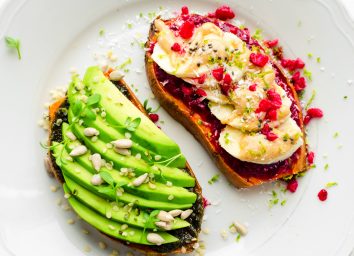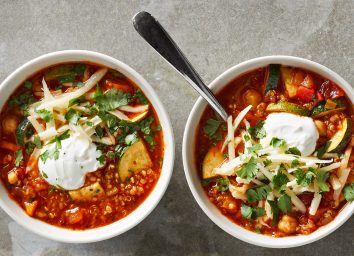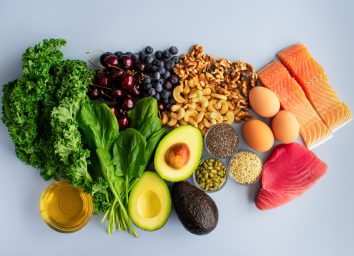7 Eating Habits To Steal From the World's Longest Living People
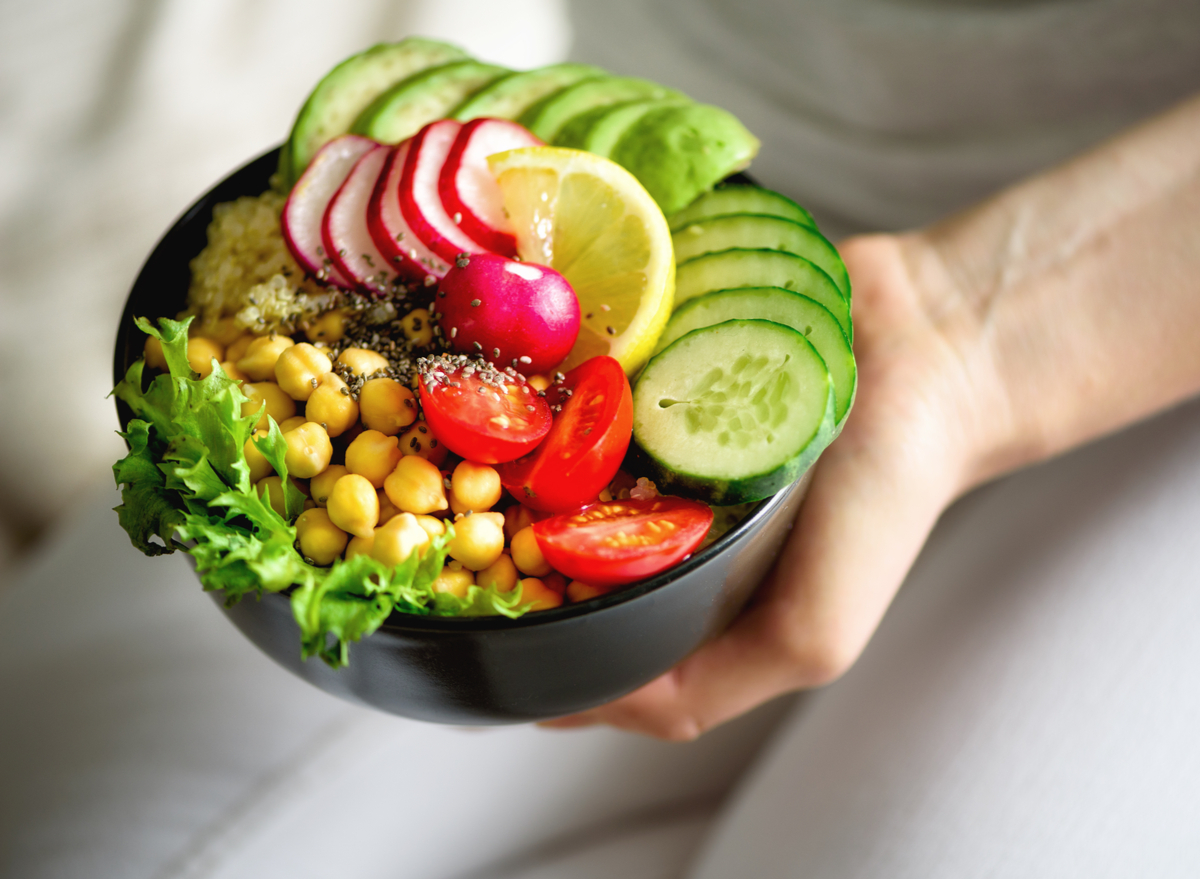
Living to 90, 100, and beyond with your brain and body still working relatively well takes more than the luck of having been blessed with the genes of longevity. From what science knows about nonagenarians and centenarians, you need a full life of physical activity, mentally stimulating social relationships, and healthy food.
But what makes up the diets of the world's longest-living people? Nearly 20 years ago, National Geographic writer Dan Buettner and National Institute on Aging researchers set out to identify communities around the world where people lived measurably healthier for a longer time than most and then looked for common lifestyle habits that kept them vigorous in their 90s, 100s and beyond. Those original hotspots of centenarian vigor included Okinawa, Japan; Sardinia, Italy; Nicoya, Costa Rica; and Ikaria, Greece. The only U.S. location was Loma Linda, California, home to one of the largest concentrations of Seventh-day Adventists (a Christian denomination) in the world. By analyzing the lifestyles of those people, Buettner wrote the best-selling books The Blue Zones: 9 Lessons for Living Longer from the People Who've Lived the Longest and The Blue Zones Kitchen, a recipe book based on that longevity diet.
If you want to live long and well, you might want to take some eating cues from the spry old folks from those areas and others. Research suggests that there's clear science behind what 100-year-olds have been putting on their dinner plates and longevity. Here's how you can eat like a Blue Zoner even if you live in Wisconsin. And after reading this, you'll want to stock up on The 100 Best Foods on the Planet.
Eat less meat.
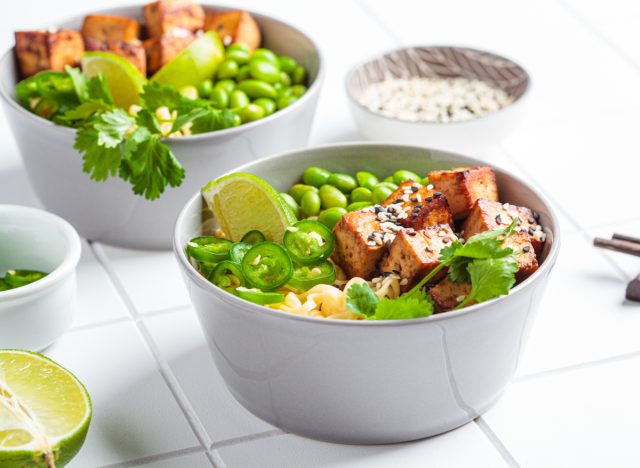
Buettner found that most people in the Blue Zones eat less than two ounces of meat five times per month. (For a point of reference, a double cheeseburger from McDonald's is three ounces of beef.) In a long-term research project by Loma Linda University looking to link lifestyle, diet, disease, and mortality, researchers followed 96,000 Seventh-day Adventists since 2002. The Adventist Health Studies found that the longest-living Adventists who were vegetarian outlived Adventists who ate meat by up to eight years. Pesco-vegetarians, who included a small amount of fish in their diets, also were among those Adventists who lived longest.
Since studies have proven that protein is an important macronutrient for satiety, maintaining body weight, and supporting muscle, if you want to eat less meat you can still get your protein by eating a bit of fish and looking to plant sources of protein.
Eat more plants.
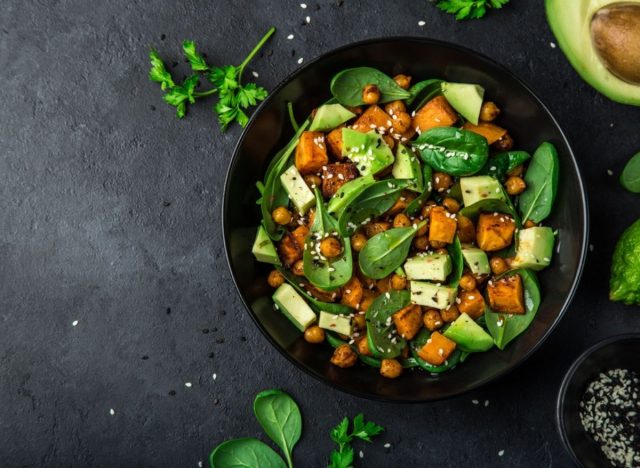
You've been hearing this advice from Eatthis.com and others for years, but are you doing it? For more motivation, look to those long-living Ikarians. Even though they live on an island in the Aegean Sea, those easy-going Greeks eat mostly plants. Just 6% of their diet is fish. Nearly 20% of their meals are greens and 11% legumes. Outside of using tobacco, the foods you eat have the greatest impact on your health and longevity, research shows.
Consider the findings of the 2019 Global Burden of Diseases, Injuries, and Risk Factors study, which estimated that poor dietary choices cause 11 million deaths globally each year. Using data from the study, researchers reporting in PLOS Medicine found that moving away from the standard Western diet by eating less red and processed meats and consuming more legumes, whole grains, and nuts could translate into an increased life expectancy of more than a decade for young people. Even 60-year-olds who made a switch to a Blue Zones-style diet could gain eight years of life, that study found.
Eat smaller fish.
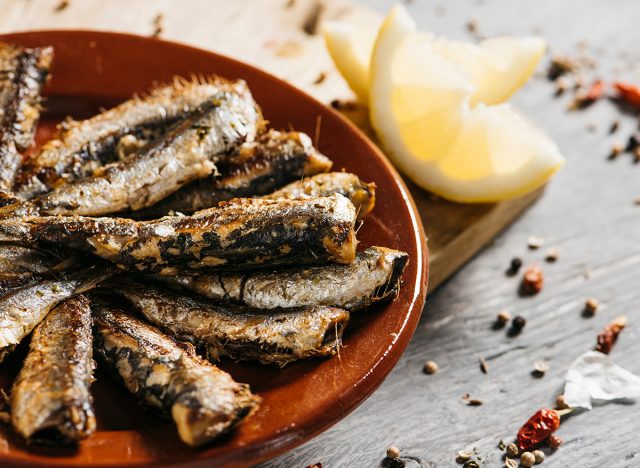
Researchers found that most people in the Blue Zone areas ate fish, but not a lot, up to three ounces three times a week at most. That's about as much seafood rich in omega-3 fats as the Dietary Guidelines for Americans advises for good brain and heart health. But the Blue Zone centenarians tend to eat small fish like sardines and anchovies. Why? Smaller fish typically contain lower mercury levels than bigger, longer-living fish that have built up higher amounts in their flesh. A study in the May 2014 issue of the American Journal of Clinical Nutrition found that the more fish people ate correlated with higher levels of mercury in their bloodstream. Eat the Blue Zones way by having less tuna, salmon, and tilapia and more sardines, herring, and mackerel. Eat smaller, younger fish to live longer and healthier.
Bean up.
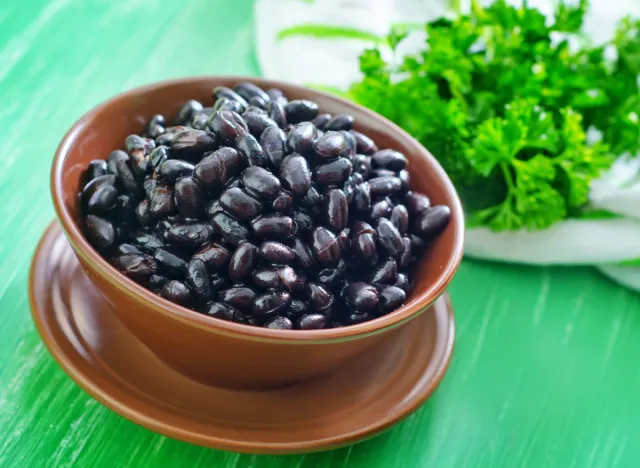
If you want to start eating like they do in the Blue Zones, do this: Eat roughly one cup of beans every day. That's one habit common to all five Blue Zone regions. Beans and legumes are foundational ingredients in Blue Zone residents' meal planning so bean up with chickpeas, red beans, lentils, peas, bean sprouts, edamame, and pintos. All make the American Diabetes Association's list of "superstar foods" for combating type 2 diabetes due to their high fiber, protein, and beneficial nutrients.
Grab a handful of nuts.
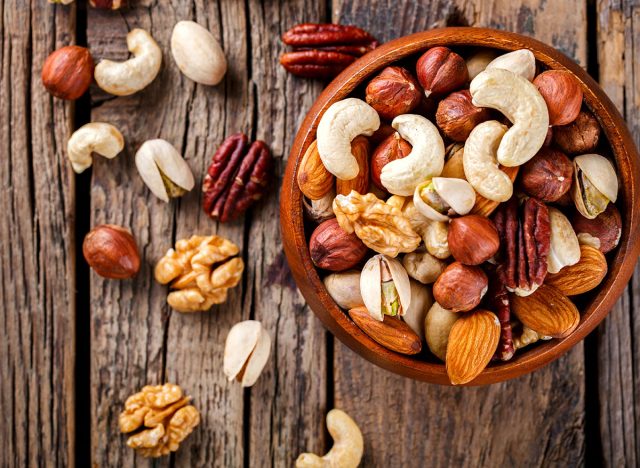
Make it two handfuls of nuts every day. That's what Blue Zone people do. Those from Ikaria and Sardinia snack on almonds. Centenarians in Nicoya prefer pistachios. The Adventists in Loma Linda eat a variety of nuts (almonds, Brazil nuts, walnuts, cashews, and peanuts). The famed Adventist Health Study 2 notes that those who eat nuts tend to live an average of two to three years longer than Adventists who don't eat nuts.
Nuts are high in fat, but their fats are the mono- and polyunsaturated varieties that lower LDL (low-density lipoprotein), the so-called "bad" cholesterol levels. A meta-analysis using data from the Nurses' Health Study found that substituting an ounce of nuts for the equivalent calories in carbohydrates was associated with a 30% reduction in coronary heart disease and switching nut fat for saturated fat was associated with a 45% reduction in risk.
Drizzle olive oil on your whole grain bread.
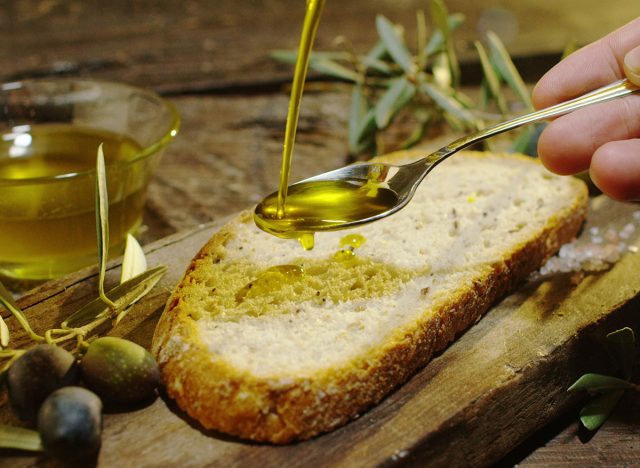
Olive oil is another heart-healthy monounsaturated fat that's found in a lot of Blue Zone meals. Drizzle it on vegetables and salads and even on bread, but make sure your bread is of the whole-grain variety. In the Blue Zones, people shun commercially produced breads made with bleached white flour. Those white breads are devoid of fiber and tend to raise blood sugar quickly, spiking insulin levels. Blue Zone bread is typically fiber-rich whole grain or sourdough; studies suggest that both of those types support a healthy microbiome.
Drink this, not that.

According to Buettner's analysis, people in the Blue Zones consume only about a fifth as much added sugars as North Americans do. That's because those folks tend not to drink soda or eat sweetened yogurt and other foods containing added sugars. They also "eat sugar intentionally, not by habit or accident," Buettner writes. In other words, they save eating sweets only for special occasions. And as for beverages, you can follow their lead by drinking mostly water, as the Adventists do.
Sardinians, Ikarians, and Nicoyans all drink coffee, which may offer protection against heart attack and stroke, Parkinson's disease, type 2 diabetes and liver disease, according to the Mayo Clinic. While all Blue Zoners drink tea, the Okinawans prefer green tea, which is rich in polyphenols and antioxidants believed to improve brain healthy by fighting oxidative stress. One study in the journal Psychopharmacology suggested that drinking green tea regularly might improve memory.
Getting hungry? Try these Recipes for a Longer Life.

